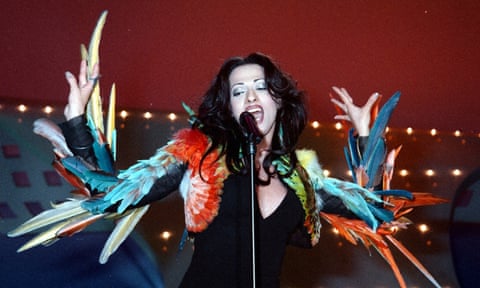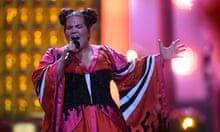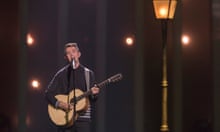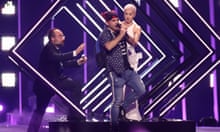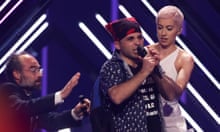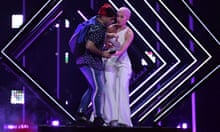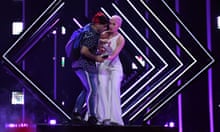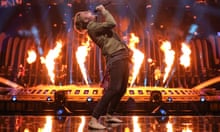She was tall, svelte and glamorous in a floor-length glitter gown, with luscious brown curls and the kind of dramatic arm movements that would put an ice dancer to shame. Plus, she had an unmistakable pronunciation of the word Cleopatra. Dana International cut a dazzling figure in May 1998 when she won Eurovision for Israel. Her song, Diva, had a lot to do with it: an earworm with a thick club beat and a karaoke-ready chorus that you could make up as you went along if you didn’t quite catch all the Hebrew.
Dana was also Eurovision’s first ever trans winner. Twenty years ago there was no Ru Paul or Trixie Mattel; the Oscar-winning Hilary Swank movie Boys Don’t Cry was a year away. The likes of TV series Transparent, or actors such as Laverne Cox, were off in the distance. The trans community wasn’t invisible, but it wasn’t the staple of the pop culture conversation that it has become; Dana’s performance at Birmingham’s National Indoor Arena felt like a watershed moment, a major celebration of a trans artist on an international stage.
It wasn’t without its trials, and Dana’s representation of her country created a furore among Israel’s Orthodox Jewish community. After her win, she addressed her detractors. “My victory proves God is on my side,” read her statement. “I want to send my critics a message of forgiveness: try to accept me. I am what I am.” Today, she claims she enjoyed the backlash. “I don’t care what they say about me,” she says. “I believe in God, in freedom, that everyone has a right to live how they choose.”
Her winning entry is still considered one of the all-time Eurovision greats – with its classic Eurodance rhythms and typically Israeli melody, it is irresistibly camp. But Dana’s legacy is greater than the song: she led the way for 2014 Austrian winner Conchita Wurst – a Shirley Bassey-type drag queen with a perfectly trimmed beard – and, more broadly, signalled the importance of the fun, free, gregarious culture of Eurovision as an annual LGBTQ-friendly celebration.
Eurovision fanatic and Radio 1 DJ Scott Mills explains: “Eurovision is about the music, but it’s also about diversity, particularly for countries that aren’t No 1 on your list of places to go if you’re gay. Dana International massively paved the way. It was an extremely brave thing to do at the time, gave a lot of people courage and raised important issues in countries where tolerance has been low.”
“I’m not saying I’m Barbra Streisand or Mariah Carey,” says Dana herself. “People don’t care about my voice. They care that I speak my opinion, without fear. They’ll say I’m so brave, blah blah blah. I’m just living my life, and it’s not an easy life.”
Two decades on, at 46, she is happy to reminisce about the lead-up to that magical night. Her offstage name is Sharon Cohen, but she was born Yaron in Tel Aviv; the youngest of three, she came from humble beginnings. “Picture in your mind a very modest house,” she says. “We had a small black-and-white TV, no stereo and one channel.” Her first memory of Eurovision was watching Israel’s 1979 victory, which turned the competition into a must-see event in her homeland. “Eurovision was the biggest evening,” she laughs. “We waited the whole year. Everything looked gorgeous. It’s a big dream to become a singer at Eurovision. When I was 12, I would bullshit that I knew I was gonna be somebody, but I couldn’t possibly dream of this.”
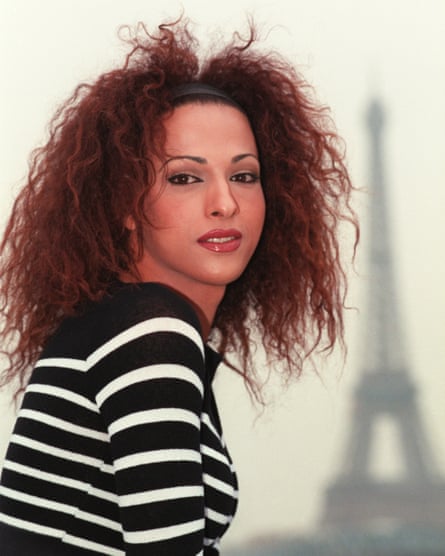
She recognised she was gay at a young age. “I started to realise why I liked these kinds of singers and not others,” she says, referring to the over-the-top theatrics of Eurovision entrants. So was it music that made her sexuality clear to her? “No, no, no! I will be vocal with you. It was sex! I was confused because I came from a traditional family. It was wrong to mention the word ‘gay’. But suddenly I felt free.”
Dancing and singing came later, once she understood her gender identity. “I knew that, being a transsexual, it would be much harder to be a doctor, a lawyer or an architect,” she says. “In showbusiness, it would be easier to be who I wanted to be.” Becoming Israel’s first drag act was a logical decision, then. When Dana was 18, she was inspired by the likes of US star Divine (“My greatest icon: Divine’s music to me was like narcotics”) and she started to work with a DJ, releasing her first song in 1990. The name Dana International, the title of her first EP, stuck by accident. “I needed to sign my first cheque, so I signed it Dana International.”
She built a robust career in Israel and won the country’s singer of the year competition in 1994, a year after undergoing gender reassignment surgery. With her sights set on Eurovision, she unsuccessfully applied to represent Israel in 1995; she tried again in 1998 with a new song, Diva. She was picked by a committee, rather than through a TV contest and the news that she would be going to Birmingham came by phone. “I was screaming and shouting,” she recalls.
Diva has its own transformation story. The lyrics she sang were: “Viva Maria! Viva Victoria! Aphrodite / Viva la diva! Viva Victoria! Cleopatra.” Originally, however, she explains, the names matched Old Testament matriarchs: “Viva Rachel! Viva Miriam! Viva Sarah!” “I said to the writer: ‘There’s no way I’m going to sing about Rachel and Miriam and Sarah. It’s not universal!’” Even with the lyrics changed, she didn’t want to perform Diva. The songwriter cajoled her and delivered her recording to the committee by hand. “I didn’t believe in the song,” Dana says. “But the rest is history.”
The week leading up to 9 May 1998 was nerve-racking for Dana. At least her dress was taken care of; she had been to Paris to work alongside the designer Jean Paul Gaultier. “He brought a hairdresser and a makeup artist. No one had ever made me up before.” When the night came, 172 points won her the crown, but until that moment winning had never entered her mind – her focus was on sparing her country from disgrace. “I was praying not to embarrass them. Israel was so tense.” Today she attributes the win to the voting process: 1998 was the only year Eurovision determined its winner purely by audience votes. “Maybe because I won they changed it back,” she says. “They were worried the gay community was taking over.”
Mills remembers Dana’s impact. “There was outrage from various countries,” he says. “They threatened to not show her performance, so her win became a statement for the community.” Over the years, Mills has witnessed many LGBTQ-fuelled performances and he traces them all back to Diva. Finland’s 2013 entry, Marry Me, for instance, was a call-to-arms for same-sex marriage, featuring a female performer in a wedding dress who kissed another woman onstage. China wouldn’t allow the kiss to be aired. “It’s mad,” says Mills. “There’s still a lot of work to do there. But it all began with Dana International.”
The Eurovision victory brought her global recognition, and she became the first Israeli act to be interviewed on MTV. She appeared on Top of the Pops, and at Pride with Kylie Minogue and Steps. “It was like a fairytale,” she says.

In 1999, she returned to the Eurovision stage and stole the winners’ thunder by falling over on stage when about to hand Sweden their trophy. “It wasn’t my fault!” she screams. “For 20 years people ask me if I did it on purpose. I was standing in a Jean Paul Gaultier dress. The director was stepping on it. I tried to step back and I fell. You don’t want to fall in a Jean Paul Gaultier dress. You want it to stay on your body as it should be! Thankfully, it was very padded, so I didn’t break anything.”
In the 00s, Dana enjoyed great success in Israel, with three studio albums and gold-certified hits. Her relationship with Eurovision was ongoing, and she performed in Copenhagen for its 50th anniversary. She made use of her platform, too, appearing at women’s political rallies and campaigning for the politician Tzipi Livni in Israel’s 2009 election.
Dana entered Eurovision again in 2011, but failed to make it to the finals with her song Ding Dong, and regrets the attempt. Today, though, she is busy: she performs regularly in Israel, is a judge on Israeli TV talent shows and is never short of a Eurovision-related invitation every time the competition comes around. I catch her just after a day in the recording studio where she is preparing her new version of the folk song Hava Nagila for Israel’s Independence Day celebrations on 14 May. She has become a mainstay of such festivities. “My presence shows a different side of Israel that the media doesn’t hear about. It’s not a big achievement – it’s only natural. I represent the gay community, a big part of Israeli society.”
As for Diva itself, the song still slaps. “It’s that time of year again when I start going through old songs,” says Mills. “I totally think Diva is one of the best. When you get to wherever Eurovision is being hosted, it’s the one Eurovision song that’s always on heavy rotation.” Viva la diva, indeed.
The Eurovision Song Contest final is on BBC One at 8pm on Saturday.
